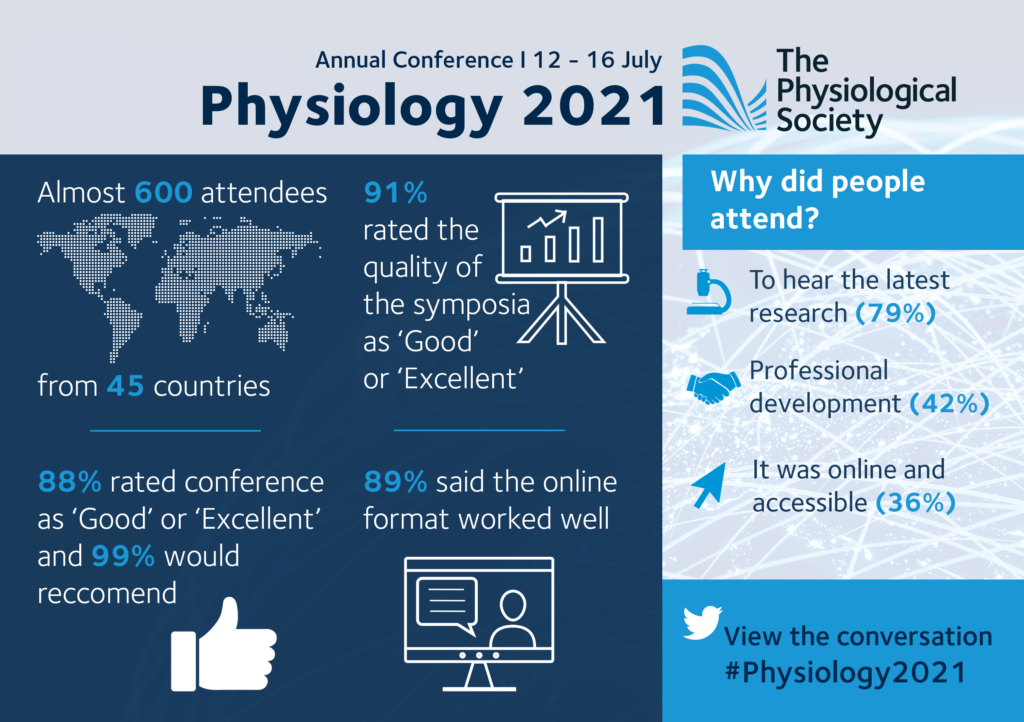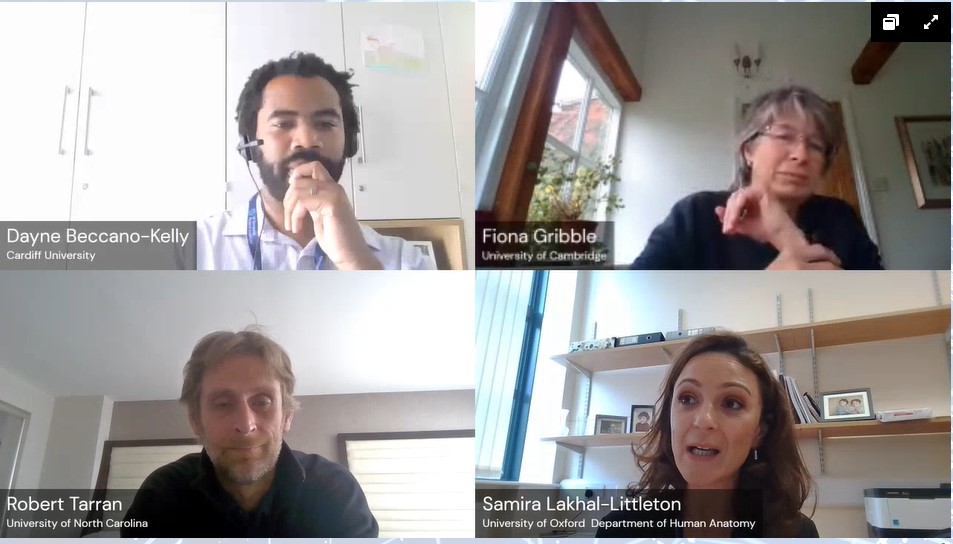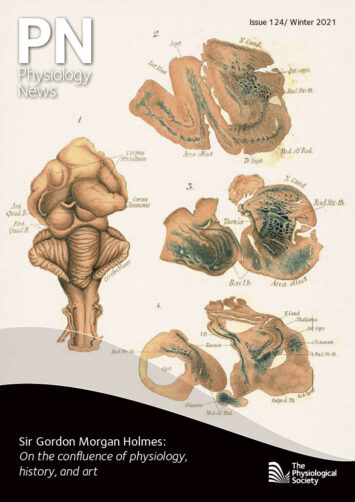
Physiology News Magazine
Our first online Annual Conference Physiology 2021
Members give testimonials from the event
Events
Our first online Annual Conference Physiology 2021
Members give testimonials from the event
Events
https://doi.org/10.36866/pn.124.39
By Professor Sue Deuchars, Chair of Conference Committee, The Physiological Society
Each year, our Annual Conference brings together the physiology community for a fantastic programme of the latest research and professional development activities. Physiology 2021 was no exception, although it did have one unique feature compared with previous years – it was held entirely online! Due to the ongoing COVID-19 pandemic, this decision was made early in the year and whilst it was disappointing not to be able to meet face to face, we welcomed a much more international community of physiologists with close to 600 attendees from 45 different countries.
Over the five days, the audience was inspired by seven Prize Lectures, and the lecturers themselves who gave an exclusive insight into their career paths to date in two “Meet the Speaker” panel discussions. Seventy-two symposia speakers showcased their work, ranging in subject from Cardiac Sodium Channel: From Function to Dysfunction to Physiological Resilience Across the Lifecourse: In Utero and Beyond. With 83 oral communications and 95 poster communications, there was plenty of opportunity to hear from researchers at all levels and across Themes. The high-quality science on show, despite the pandemic, made clear the resilience and motivation of our community.
Alongside our scientific programme, we had several professional development sessions. Two of these sessions allowed attendees to reflect on the past year and what it means for the future, with a workshop looking at what is next in teaching and a townhall-style discussion exploring what life could look like for a researcher long-term following the COVID-19 pandemic.
There were also well-attended sessions with our Editors-in-Chief of The Journal of Physiology and Experimental Physiology and a panel of knowledge exchange experts. Finally, attendees heard more about The Society’s competition, “Aspiring Black Physiologists”, which has been developed as part of The Society’s wider D&I commitment and were invited to give their feedback into this work.
As always, Physiology 2021 could not have happened without our members and the wider physiology community, and so we extend our gratitude to all those involved and those who joined us over the week. Here two attendees reflect on their highlights.

Dr Yevheniia Kravenska, University of Padova, Italy
I have been a member of The Physiological Society for many years, I regularly participate in their Annual Conferences, and I can only say good things about the events and the wonderful team. This year, for the first time, the world faced the need to hold global online conferences, and The Society has adapted remarkably well.
First, I was grateful for the detailed pre- conference webinar on preparing online posters. The platform turned out to be user-friendly and colourful. Online support, as always, was at its best; the team was friendly, kind and competent.
Regarding the conference itself, I would like to immediately note the rich and thorough programme, with sessions ranging from the introduction of new technologies to Prize Lectures.
I really enjoyed the impressive Paton Prize Lecture by Professor Semir Zeki, which, in addition to covering very interesting scientific material, contained thought-provoking quotes of famous people.
I was also sincerely amused by the quiz, in which I took part almost by accident: I had no idea how witty seemingly simple questions might be (especially about the vortex).
The work of a cheerful and close-knit team, as well as the humour with which the Society approached the organisation of the quiz, boosted my spirits for many days.
I was also pleased with my presentation time, by the significant interest of the audience, as well as by their sincere and pleasant feedback, which I subsequently shared with my co-authors.
I also would like to note the affordable price of participation in Physiology 2021, in comparison with other similar conferences. The financial aspect can play a key role for participants from poorer regions, who get a chance to demonstrate their results and make useful contacts for further cooperation.
Summing up, I want to thank The Physiological Society for another excellent Conference that will be remembered for a long time. Your hard work for many years, your kindness and the intention to do your best make our world a little better.

Sophy Creed, University of Exeter, UK
Last month, I, along with 600 other scientists from across the world attended The Physiological Society’s Annual Conference, Physiology 2021, which was delivered virtually.
There was a wealth of interactive and collaborative sessions in a variety of formats including 95 ePosters, 83 oral communications, 72 symposia speakers and 7 Prize Lectures. I was extremely privileged to have the chance to present my undergraduate research as an ePoster on the first day of the conference and become one of the recipients of the prestigious Rob Clarke Award.
This award recognises excellence in undergraduate physiology research, given in memory of Dr Rob Clarke (1956 – 2004) who made important contributions to physiology as a researcher and teacher, and who was a passionate advocate for nurturing the next generation of physiologists. As one of only eleven recipients for 2021, I am very proud to have my work recognised, and I must take this moment to say congratulations to Keady Flynn from Trinity College Dublin, Ireland who received both an abstract and the presentation award at Physiology 2021.
I presented my research entitled “Exploring the use of breath-holding for measuring the trajectories of cerebral blood flow and regulation in the developing brain” twice over the course of an hour to four leading physiologists from the UK, and this was despite being hospitalised the week before and being left with transient aphasia due to my brain injury. I want to take this opportunity to extend my thanks and gratitude to them for being very understanding, with a special nod to Eleanor Newton, Professional Development Officer with The Society who guided me through the whole process and made sure I was fully supported throughout.
I was able to attend several sessions over the course of the week, including a “Meet the Editors” professional development session with Professors Kim Barrett and Michael Tipton that allowed for an insight into how research is gathered and how publications are produced, which was very helpful for an early career researcher such as myself. Research presentations and ePosters were categorised into specialism themes including but not limited to cardiac and vascular physiology, epithelia and membrane transport, neuroscience, and human environmental and exercise physiology. This allowed the attendee to pick and choose what to attend based on personal preference or interests. The whole platform was really user friendly, especially for someone like me who has acquired dyslexia, and I found I was able to navigate around with ease, this included when it came to my own presentation, which was created on Kubify- Learning Toolbox for ePosters.
During the conference, I attended an ePoster presentation by Curtis Wadey from the University of Exeter, who discussed the role of cardiopulmonary exercise testing (CPET) in predicting mortality and morbidity in people with congenital heart disease and I was then able to have a good chat with him afterwards about his work. Another presentation by Annie Constable demonstrated her work in childhood bone health as part of the Physical Activity and Nutrition in Children (PANIC) study, and at the end there was opportunity to observe a live Q&A about the research, which I found very informative. I was also thrilled to watch the Annual Review Prize Lecture by Professor Atwell on the regulation of blood-flow at the capillary level in health and disease; it was really relevant to my own research interests and will inform my work to come.
This type of networking and research sharing through ePosters, virtual presentations and open discussion has been really accessible, and in turn raised my confidence for attending conferences in the future, as it was quite a daunting prospect as a first timer to such an event! Attending and presenting at Physiology 2021 has led to me learning a whole host of new digital skills and given me the valuable chance to participate at an international scientific forum. I would like to thank The Physiological Society for the opportunity to attend the conference, as well as my supervisor and my lab The Cerebrovascular Research Unit at the University of Exeter, for supporting me throughout my dissertation.
